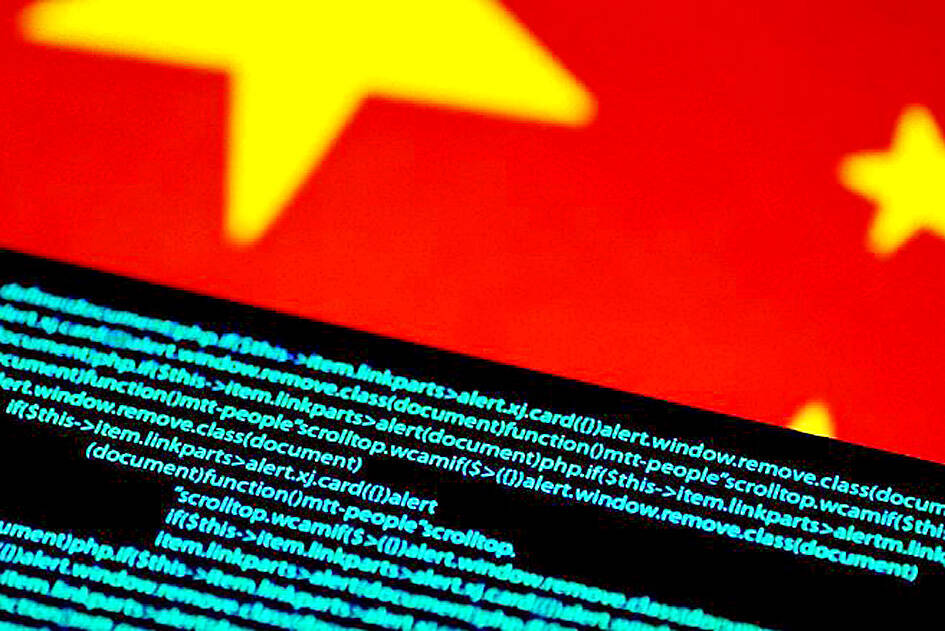Beijing’s cognitive warfare tactics against Taiwan are becoming more sophisticated, with hackers targeting network devices to spread disinformation as next year’s presidential and legislative elections near, prosecutors and judicial authorities said, adding that several hacks targeting Taiwanese had been traced to Hong Kong.
Cognitive warfare tactics against Taiwan are constantly evolving, from disseminating disinformation through crude messages using simplified Chinese characters and Chinese slang during the COVID-19 pandemic to spreading false news through nearly 1,500 social media accounts during the run-up to last year’s local elections, sources familiar with the matter said.
This year, foreign forces have shifted their methods, hacking Internet of Things (IoT) devices in Taiwan that use weak passwords to spread disinformation as though it was coming from a Taiwanese, the sources said.

Photo: REUTERS
The hackers seek to publish messages through a target’s social media account after gaining control of their devices, and then delete connection records to try to hide the origin of the poster, they said.
The actions are an attempt to divide Taiwan from within to intensify political conflicts, they said.
Investigators looking into the hacking cases said that Hong Kong has become an important base for launching cyberattacks against Taiwan, as major recent disinformation campaigns have been found to have originated in Hong Kong.
For example, online posts saying that officials had smuggled cigarettes during the president’s trip to Central America in April came from a hacked router in a motel in Kaohsiung, the Cyber Security Investigation Office said.
Using an Internet protocol address in Hong Kong, a hacker logged into a Facebook account they created and took control of two accounts of Taiwanese on the Mobile01.com Web site, and used the three accounts to make posts showing altered cigarette purchase orders, it said.
Although the hacker deleted their connection records, authorities traced the posts on the three Taiwanese accounts to the router, prosecutors and judicial authorities said.
Regarding online rumors in April saying that Chinese missiles had breached Taiwan’s airspace, the Cyber Security Investigation Office said that those posts had also originated in Hong Kong.
A foreign actor had hacked into a router of an international shipping company in Taoyuan through a device in Hong Kong at UCloud Technology Co (優刻得), which offers colocation services for servers and network equipment, and logged into a Professional Technology Temple (PTT) bulletin board system account owned by a Taiwanese to post about the missiles, it said.
To prevent disinformation from affecting the elections, the Taipei District Prosecutors’ Office is heading up an investigation team focused on major national disinformation cases, while other cases are to be handled by local district prosecutors’ offices, the Supreme Prosecutors’ Office said.
Dedicated chief prosecutors are to be assigned by local offices in the six special municipalities to handle the cases, it added.
The Ministry of Justice Investigation Bureau urges people to delete unused social media accounts, update their IoT devices and use strong passwords.
People should carefully verify online information and avoid spreading it before confirming its authenticity, the bureau added.

ENDEAVOR MANTA: The ship is programmed to automatically return to its designated home port and would self-destruct if seized by another party The Endeavor Manta, Taiwan’s first military-specification uncrewed surface vehicle (USV) tailor-made to operate in the Taiwan Strait in a bid to bolster the nation’s asymmetric combat capabilities made its first appearance at Kaohsiung’s Singda Harbor yesterday. Taking inspiration from Ukraine’s navy, which is using USVs to force Russia’s Black Sea fleet to take shelter within its own ports, CSBC Taiwan (台灣國際造船) established a research and development unit on USVs last year, CSBC chairman Huang Cheng-hung (黃正弘) said. With the exception of the satellite guidance system and the outboard motors — which were purchased from foreign companies that were not affiliated with Chinese-funded

PERMIT REVOKED: The influencer at a news conference said the National Immigration Agency was infringing on human rights and persecuting Chinese spouses Chinese influencer “Yaya in Taiwan” (亞亞在台灣) yesterday evening voluntarily left Taiwan, despite saying yesterday morning that she had “no intention” of leaving after her residence permit was revoked over her comments on Taiwan being “unified” with China by military force. The Ministry of the Interior yesterday had said that it could forcibly deport the influencer at midnight, but was considering taking a more flexible approach and beginning procedures this morning. The influencer, whose given name is Liu Zhenya (劉振亞), departed on a 8:45pm flight from Taipei International Airport (Songshan airport) to Fuzhou, China. Liu held a news conference at the airport at 7pm,

GRIDLOCK: The National Fire Agency’s Special Search and Rescue team is on standby to travel to the countries to help out with the rescue effort A powerful earthquake rocked Myanmar and neighboring Thailand yesterday, killing at least three people in Bangkok and burying dozens when a high-rise building under construction collapsed. Footage shared on social media from Myanmar’s second-largest city showed widespread destruction, raising fears that many were trapped under the rubble or killed. The magnitude 7.7 earthquake, with an epicenter near Mandalay in Myanmar, struck at midday and was followed by a strong magnitude 6.4 aftershock. The extent of death, injury and destruction — especially in Myanmar, which is embroiled in a civil war and where information is tightly controlled at the best of times —

Taiwan was ranked the fourth-safest country in the world with a score of 82.9, trailing only Andorra, the United Arab Emirates and Qatar in Numbeo’s Safety Index by Country report. Taiwan’s score improved by 0.1 points compared with last year’s mid-year report, which had Taiwan fourth with a score of 82.8. However, both scores were lower than in last year’s first review, when Taiwan scored 83.3, and are a long way from when Taiwan was named the second-safest country in the world in 2021, scoring 84.8. Taiwan ranked higher than Singapore in ninth with a score of 77.4 and Japan in 10th with